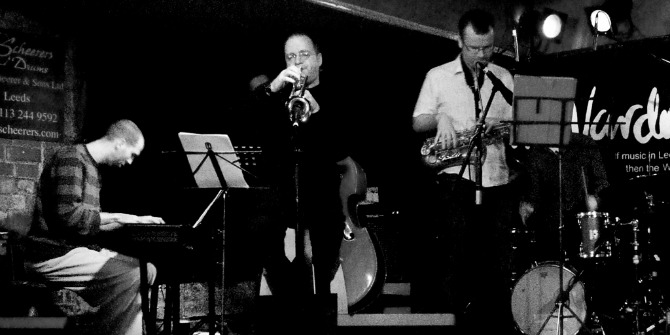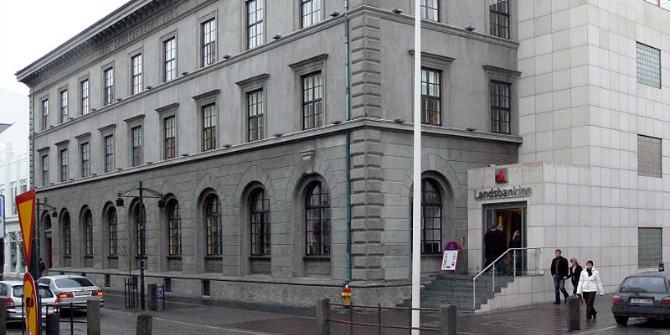
As recorded music revenues decline, live music is increasing in economic importance. But working conditions in the sector are a problem. Live musicians frequently suffer from low pay, casualised work contracts, and unpredictable and insecure careers. These concerns have serious knock-on effects. They skew opportunities towards those from affluent backgrounds, who can tolerate periods of deep career uncertainty. And poor quality labour markets fatally undermine the recurrent policy objective of using the ‘creative industries’ as a catalyst for regeneration in post-industrial urban areas.
My research examined labour markets for live jazz musicians in London and Paris. It became clear that these problems are exacerbated by poor industry practices. For example, musicians are increasingly asked to provide services for free, with employers arguing that dubious promises of ‘exposure’ constitute an adequate substitute for pay. Such practices extend from the grassroots to the highest level, where even events like the London Olympics refused to pay musicians. I found multiple cases of venues altering agreements with musicians after performances had taken place, or forcing musicians to take sole responsibility for publicising events. All of these practices undermine the sustainability of a career in music, building ever-higher entry barriers for those without additional sources of support.
The research asked how musicians’ conditions could be improved. One possibility is stronger institutional support. In France, the intermittents du spectacle system provides monthly minimum incomes for arts workers, supported through employer and worker social contributions. This undoubtedly helps to bring stability to arts workers’ lives. But the system in France has been pressured not only by austerity measures, but also by the growth of a ‘black’ economy where employers find ways to engage musicians on an under-the-table basis. CGT-SNAM, the main union for French musicians, is likely to be mobilising against further retrenchment of this system; in 2003, it initiated a strike wave against a previous round of reforms that shut down the prestigious Festival d’Avignon.
The British Musicians’ Union (MU) has tried to support musicians in seeking fairer deals from employers. It has launched the ‘Fair Play Guide’, which provides guidance on what kinds of practices should and should not be accepted, and cautioning music workers against common justifications for low pay (such as presenting gigs as ‘competitions’ with dubious ‘prizes’ instead of a fee). It has also started the ‘Work Not Play’ campaign, which encourages musicians to name and shame employers that offer inadequate pay.
The main difficulty for French and British unions in pursuing these initiatives is their weak presence at ‘workplace’ level. For many musicians, working life comprises diverse one-off arrangements with a diffuse network of employers and co-workers (the personnel of many working bands changes rapidly). This makes it difficult to build a sustained organising culture- the closest to this in music is in large, stable orchestral and theatrical ensembles where union reps and literature usually have a much more visible role.
This is exacerbated by musicians’ own conflicting motivations: it is difficult to maintain union rates when musicians might have so many reasons other than pay for accepting work (building networks, gaining exposure, or the enjoyment of playing). Indeed, it is these conflicting motivations that make exploitative conditions so easy to perpetuate and so difficult to challenge. For this reason, the real intended audience of campaigns such as ‘Work Not Play’ is employers themselves. It may be a big ask to get musicians to turn down poorly-paying work, but by pressuring venues directly through publicity-generating tactics, unions can try to limit the extent to which such work is offered in the first place.
Otherwise, musicians rely on informal tactics in response to poor working conditions. Through my interviews, I found cases of long-running, occasionally even violent confrontations between musicians and employers, as well as the use of social media to stage public attacks on the reputations of venues or agents that treated workers poorly. These kinds of situations are a symptom of the power imbalances and disorganisation endemic in the live music labour market.
To see progress, various things need to happen. The normalisation of unpaid work must be reversed. People that employ musicians should be interacting with musicians’ unions as a matter of course. A possible first step here would be some form of ‘fair trade’ equivalent for live music; a guarantee of union-approved pay and conditions for musicians, as a means of raising a venue’s profile and credibility within the live music scene. Most importantly, musicians themselves need to be more assertive in checking the fees they are offered against expected industry norms. It is through these efforts that a fairer deal can be attained in live music.
♣♣♣
Notes:
- This post is based on the author’s paper The labour market for jazz musicians in Paris and London: Formal regulation and informal norms, in Human Relations, March 2016 vol. 69no. 3 711-729.
- This post gives the views of its authors, not the position of LSE Business Review or the London School of Economics.
- Featured image credit: Martin Laine CC-BY-2.0
 Charles Umney teaches comparative employment relations at Leeds University Business School. His published work is mainly concerned with labour markets in live music, and how trade unions can influence them. More recently, he has begun to focus on the marketisation of health and social policy, with a particular interest in France.
Charles Umney teaches comparative employment relations at Leeds University Business School. His published work is mainly concerned with labour markets in live music, and how trade unions can influence them. More recently, he has begun to focus on the marketisation of health and social policy, with a particular interest in France.






Unfortunately it looks like Europe is catching the same disease that has infected the States for the last 30 years. Unfortunately as well. part of the problem also lies with the fact that there is so much worthless music out there (i.e. punk, rap, trance, house, and a lot of dance pop). Why would anyone want to pay someone for screaming “motherf%&@ker” over a beat stolen from another musician for three hours? Why would you pay for someone to play a bunch of songs all written with the same 4 chords and sung out of key? The unfair part is that real musicians like jazz, classical and some forms of rock get painted with the same brush by the club owners and promoters. Punk, rap, and other degenerate, parasitic forms of “music” (if you can call it that) have had a very negative effect of the art form as a whole, both aesthetically and business wise.
First off, there’s a problem defining a ‘pro’ musician…. in any other field some certificate or diploma verifies a level of competence. A folk singer who has something original worth hearing didn’t get his worth from pursuing studies in a school, same can be said of Jazz, Rock, or Latin musicians. There is no Masters Degree of Music Culture. Anyone who can sing/rap to a certain degree, strum a few chords, and especially has charisma can therefore claim to be a pro musician, as long as he can sell somebody on the idea. They may or may not be worth it; but they can often garner more attention than bona fide accomplished players, and they may even be flooding the market. Where is the line between a creative musician with no competence outside of his own ‘creation’ of questionable worth, and a fully rounded musician with the experience and knowledge of a dentist? It’s a question of the audience’s perception as to who deserves to be supported, I’m afraid…
The last sentence is indeed the key to the whole problem “musicians themselves need to be more assertive in checking the fees they are offered against expected industry norms”.
We as musicians have had a tendency to force our own fees down year on year, not least by failing to educate our students in the basic economics of only accepting work at a sensible rate that keeps pace with inflation.
When other musicians say “but I need the money” I often wonder if they have considered that they might earn more performing (and be more fulfilled overall) if they found a second income-stream to their bow…e.g.teaching, bike-courier, taxi-driver, 3 xamples of friends of mine who have a flexible, casual job and also work with world class artists and get paid properly to perform brilliantly.
Hi Jonny, we have previously posted an article in which Shoshana Dobrow Riza and Daniel Heller discuss (in my own words now) the conflict between one’s calling in life (she mentions musicians specifically) and trying to make ends meet. Having a side job is one of the possibilities she mentions, in line with what you suggest here. Here’s the link if you’re interested: https://blogs.lse.ac.uk/businessreview/2015/09/16/having-a-strong-calling-can-help-you-make-challenging-career-decisions/
As someone who studied at music college but is no longer a ‘pro’, I find this a really interesting topic. Personally, I love live music and would always look to hire a live band over substituting for something pre-recorded or cheaper.
The examples that are made in the article around working for free are not unique to music, or even to the arts. Ask anyone that has set up their own business (many musicians are self employed so the analogy is sound) and they will probably tell you how they had to spend a lot of time working for free or not selling their products for their ‘fair’ value in order to gain exposure. Incidentally, many would also say how they ultimately didn’t manage to earn a good wage, their business didn’t work and they decided to change business or their career entirely.
In any case , what is ‘fair’? It is perhaps unfair that footballers get paid in a week a multiple of what more worthy jobs would earn in a year but this is about supply and demand. Unfortunately the music industry suffers from horrible supply and demand dynamics…There is just not enough people who want to watch all the ‘proper’ music of jazz and classical etc. (Personally I am a fan of both). Conversely, there is far too much supply: there is always a great amateur band willing to work for free (should that be disallowed?) or, for some ’employers’, an iPod is perfectly adequate.
Employers being exploitative? Surely this is no different to any of us hunting around for the best deal – we look for the best trade off between cost and the quality of product/service. If we believe that an unqualified tradesman can do something as well as a qualified one, for less money, we’ll probably use him. If part of the ‘price’ we are paying is offering experience, then that’s fine, isn’t it?
My main concern is that education of the music business is not better than it is. Colleges churn out excellent musicians, without giving them an appreciation for the challenges they will face when they hit the real world and have to earn money for what they love doing. This in my view is what we should focus on.
The Province of Québec attempted to establish a Parity Commission in the 1970s. It’s purpose was to ensure that venues – mostly clubs, but some theatres – were to pay musicians union scale – even if they weren’t in the union. The theory being that union musicians were “professional” and their union provided accountability to the employer. The non-professionals could be hired for the same basic scale – minus pension and benefits – but, hopefully, these musicians themselves would see the long term benefits of belonging to the union. This two-tiered system had merit in separating the the musicians into an entry-level group (as well as those who had low aspirations) and a quantifiable qualified professional group (perhaps an audition and/or degree would be required).
I haven’t researched this, but as an aspiring professional musician myself, it seemed the working musicians sabotaged this – claiming their right-to-work was inalienable, that government and it’s “inspectors” had no right to prevent them from becoming impoverished through exploitation.
The result today – especially for highly trained and artistic jazz musicians – is ~~~~ no sustainability as a “local” musician. Even the jazz festivals participated in this exploitation – but that’s another story.
There are good ideas for the solution to this problem – one of them being that instead of dividing grant monies to many applicants – ensuring they all remain impoverished – that only the very best are rewarded with sustainable funding over a number of years. Attached to this would be the reduction of administrator fees. Yes – let’s exploit the producers, managers, advertisers, accountants and others by making sure their payment does not exceed that of the musicians.
This seems to be a European problem. In Switzerland and Germany it isn’t much better: http://jazzstudie2016.de/jazzstudie2016_small.pdf
http://www.nzz.ch/feuilleton/musik/weshalb-ein-schlagzeuger-mit-dem-gedanken-spielt-tramfuehrer-zu-werden-1.18681284
There is also the issue of open mic gigs, where the OM organiser gets paid but the performers don’t.
Interesting piece. Some of the data, however, seem to be selected to fit the conclusion. The first sentence, for example, uses the growth of stadium gigs to suggest that live music is a money-spinner, while the scale and number of London jazz venues suggests otherwise. The blog asserts that the situation is worsening, but offers no evidence to support this claim. Open mic and jam sessions seem relatively successful in reducing barriers to a music (or stand up) career, however small the audience. An attempt at analysis of unintended consequences from policies to address established norms would be valuable. What impact would “name and shame” tactics have on small venues’ decisions on the type of entertainment they provide? Might new norms of payment increase barriers to entry rather than reduce them, and favour the mainstream artist over the experimental?